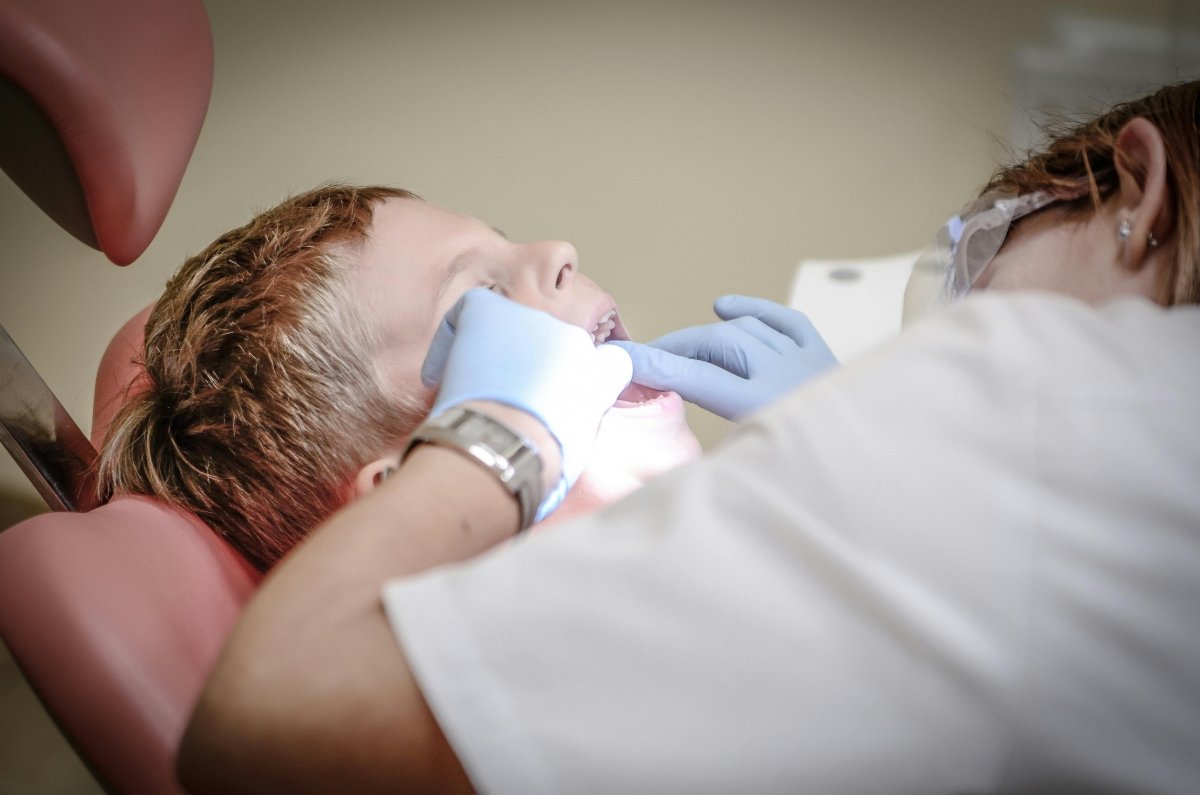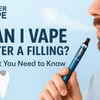Can Vaping Cause Gum Disease? Unpacking the Risks to Your Oral Health

Can Vaping Cause Gum Disease? Unpacking the Risks to Your Oral Health
Vaping has skyrocketed in popularity in recent years, often touted as a safer alternative to traditional smoking. But while it may be less harmful in some respects, vaping is not without its risks, particularly when it comes to your oral health. One question that frequently arises is: can vaping cause gum disease? The answer, unfortunately, is a resounding yes.
This comprehensive article delves deep into the connection between vaping and gum disease, exploring the various ways e-cigarettes can impact your oral health. We'll examine the science behind these effects, discuss the symptoms to watch out for, and provide practical advice on mitigating the risks and maintaining optimal oral hygiene in the age of vaping.
Understanding the Link Between Vaping and Gum Disease
While vaping doesn't involve burning tobacco like traditional cigarettes, it still delivers nicotine, often alongside a cocktail of other chemicals, into your mouth and lungs. Nicotine, whether inhaled through smoke or vapor, is a vasoconstrictor, meaning it narrows your blood vessels. This reduced blood flow to your gums deprives them of essential oxygen and nutrients, making them more susceptible to infection and inflammation. This is why smokers and vapers alike often exhibit paler gums compared to non-smokers.
Furthermore, many e-liquids contain propylene glycol (PG) and vegetable glycerin (VG), which are generally recognized as safe for ingestion. However, their effects on oral tissues when inhaled as vapor are still being investigated. These substances can irritate the soft tissues in your mouth, potentially contributing to inflammation and dryness. This dryness, in turn, can disrupt the natural balance of your oral microbiome, as saliva plays a crucial role in washing away food particles and harmful bacteria.
But the impact goes beyond nicotine and PG/VG. Research has shown that vaping can significantly alter the oral microbiome, the delicate balance of bacteria in your mouth. A study published in iScience found that e-cigarette users had a distinct oral microbiome compared to both smokers and non-smokers, with an increased prevalence of bacteria associated with gum disease. This disruption can lead to an overgrowth of harmful bacteria, further increasing the risk of gum disease and other oral health issues.
Explore our wide selection of nicotine-free e-liquids to reduce the impact on your oral health.
The Spectrum of Gum Disease: From Gingivitis to Periodontitis
Gum disease, also known as periodontal disease, is a chronic inflammatory condition that affects the tissues supporting your teeth. It typically progresses in stages:
- Gingivitis: The early stage of gum disease, characterized by red, swollen, and bleeding gums. You might notice this bleeding when you brush or floss your teeth. Gingivitis is often reversible with professional cleaning and improved oral hygiene.
- Periodontitis: If left untreated, gingivitis can progress to periodontitis. In this stage, the inflammation extends deeper, damaging the bone and ligaments that hold your teeth in place. This can lead to the formation of periodontal pockets, which are spaces between the gums and teeth where bacteria can accumulate. Periodontitis can lead to tooth loss, bone loss, and other serious complications, including an increased risk of heart disease, stroke, and diabetes.
Both vaping and smoking significantly increase your risk of developing both gingivitis and periodontitis. Studies have shown that vapers are more likely to exhibit signs of gum inflammation and have deeper periodontal pockets (spaces between the gums and teeth) than non-smokers. A 2020 study in the Journal of Periodontology found that e-cigarette users had a 78% higher risk of developing periodontitis compared to non-users.
Recognizing the Signs: How to Tell if Vaping is Affecting Your Oral Health
Early detection is crucial in managing gum disease. Here are some telltale signs that vaping might be taking a toll on your oral health:
- Bleeding gums: This is often one of the first noticeable symptoms of gum disease. You may notice blood when you brush your teeth, floss, or even bite into hard foods.
- Swollen or tender gums: Your gums may feel puffy or sore to the touch. They may also appear redder than usual.
- Receding gums: As gum disease progresses, your gums may start to pull away from your teeth, exposing the roots. This can make your teeth appear longer and can increase sensitivity to hot and cold foods.
- Persistent bad breath: Bad breath that doesn't go away even after brushing and flossing can be a sign of gum disease. This is caused by the buildup of bacteria in your mouth.
- Loose teeth: In advanced stages of periodontitis, your teeth may become loose or even fall out. This is due to the damage to the bone and ligaments that support your teeth.
- Changes in your bite: You may notice that your teeth don't fit together the same way they used to. This can be a sign of bone loss and shifting teeth due to periodontitis.
- Sensitivity to hot and cold: If your gums have receded, exposing the roots of your teeth, you may experience increased sensitivity to hot and cold foods and drinks.
- Pain or discomfort when chewing: Gum disease can cause pain and discomfort when chewing, making it difficult to enjoy your favorite foods.
If you experience any of these symptoms, it's essential to schedule a checkup with your dentist as soon as possible.
Does Vaping Ruin Your Teeth? Beyond Gum Disease
While the link between vaping and gum disease is well-established, the impact of vaping on your teeth is a bit more nuanced. Unlike smoking, which stains teeth and increases the risk of oral cancer, vaping's effects on tooth enamel are less clear-cut.
Some studies suggest that certain flavorings in e-liquids, particularly those with acidic pH levels, can erode tooth enamel, making your teeth more susceptible to cavities. For example, a study in the Journal of the American Dental Association found that e-cigarette aerosols containing cinnamon and menthol flavorings significantly softened tooth enamel. However, more research is needed to fully understand the long-term effects of vaping on tooth health.
It's important to note that nicotine itself can also stain your teeth, albeit to a lesser extent than tobacco smoke. This staining can be caused by the nicotine itself or by other chemicals in e-liquids.
Learn more about the different types of vape devices and how they might impact your oral health.
Taking Control: How to Protect Your Oral Health While Vaping
If you're not ready to quit vaping altogether, there are steps you can take to minimize the risks to your oral health:
- Practice meticulous oral hygiene: Brush your teeth twice a day with fluoride toothpaste and floss daily. Consider using an electric toothbrush for a more thorough clean. Pay attention to the gum line and make sure to brush gently to avoid irritating your gums.
- Stay hydrated: Drink plenty of water throughout the day to combat dry mouth, a common side effect of vaping that can increase your risk of gum disease. Chewing sugar-free gum can also help stimulate saliva production.
- Choose e-liquids wisely: Opt for e-liquids without nicotine or with lower nicotine concentrations. Avoid overly sugary or acidic flavors that can damage your teeth. Look for e-liquids that are specifically formulated to be less harmful to oral health.
- Visit your dentist regularly: Schedule checkups and cleanings at least twice a year, or more frequently if you notice any signs of gum disease. Inform your dentist that you vape so they can provide personalized advice and monitor your oral health more closely.
- Consider alternative nicotine delivery systems: If you're using vaping as a way to quit smoking, consider other nicotine replacement therapies, such as patches, gum, or lozenges. These methods may be less harmful to your oral health.
- Rinse your mouth after vaping: Rinsing your mouth with water or mouthwash after vaping can help wash away residual e-liquid and reduce the contact time between the chemicals and your oral tissues.
- Don't vape excessively: Like any habit, moderation is key. Frequent and prolonged vaping sessions can increase the exposure of your mouth to potentially harmful substances.
Addressing Gum Disease Caused by Vaping
If you've already developed gum disease due to vaping, it's important to seek professional treatment as soon as possible. Your dentist can assess the severity of your condition and recommend the appropriate treatment plan.
Treatment options for gum disease may include:
- Professional cleaning: This involves removing plaque and tartar buildup from your teeth and gums. Your dentist or hygienist will use specialized tools to clean above and below the gum line.
- Scaling and root planing: A deeper cleaning procedure that removes plaque and tartar from below the gum line. This procedure helps smooth the root surfaces of your teeth, making it more difficult for bacteria to attach.
- Antibiotics: In some cases, antibiotics may be prescribed to control the infection. These can be topical (applied directly to the gums) or oral (taken by mouth).
- Surgery: For advanced cases of periodontitis, surgical intervention may be necessary
to repair damaged tissues and restore gum health. These procedures may involve grafting tissue from another part of your mouth or using synthetic materials to regenerate lost bone and gum tissue.
Find a vape shop near you to explore different e-liquid options and discuss your oral health concerns with our knowledgeable staff.
The Impact of Different Vaping Styles on Oral Health
The way you vape can also influence its impact on your oral health. There are two main vaping styles:
- Mouth-to-lung (MTL): This style mimics the way people smoke traditional cigarettes. The vapor is first drawn into the mouth and then inhaled into the lungs.
- Direct-to-lung (DTL): In this style, the vapor is inhaled directly into the lungs, similar to taking a deep breath.
DTL vaping typically involves larger devices, higher wattage, and lower nicotine concentrations. It produces larger clouds of vapor and a more intense throat hit. MTL vaping, on the other hand, uses smaller devices, lower wattage, and higher nicotine concentrations.
While more research is needed to determine the specific effects of each vaping style on oral health, it's plausible that DTL vaping, with its larger vapor production, could lead to increased exposure of the oral tissues to potentially harmful chemicals. This could potentially increase the risk of gum disease and other oral health issues.
Vaping and Dry Mouth: A Recipe for Oral Health Problems
One of the common side effects of vaping is dry mouth, also known as xerostomia. This occurs because the propylene glycol and vegetable glycerin in e-liquids can absorb moisture from your mouth. Nicotine can also contribute to dry mouth by reducing saliva production.
Saliva plays a crucial role in maintaining oral health. It helps wash away food particles and bacteria, neutralizes acids that can damage your teeth, and contains minerals that strengthen your enamel.
When your mouth is dry, you're more susceptible to:
- Gum disease: Saliva helps control the bacteria in your mouth. Without enough saliva, harmful bacteria can thrive, increasing your risk of gum disease.
- Tooth decay: Saliva helps neutralize acids that can erode your tooth enamel. Dry mouth can make your teeth more vulnerable to cavities.
- Bad breath: Saliva helps wash away food particles and bacteria that can cause bad breath. Dry mouth can lead to persistent bad breath.
- Oral thrush: This fungal infection can develop when the balance of bacteria in your mouth is disrupted, which can happen with dry mouth.
If you experience dry mouth from vaping, there are several things you can do to alleviate it:
- Drink plenty of water: Staying hydrated is crucial for combating dry mouth.
- Chew sugar-free gum: Chewing gum can stimulate saliva production.
- Use a humidifier: Adding moisture to the air can help prevent dry mouth.
- Avoid caffeine and alcohol: These substances can dehydrate you and worsen dry mouth.
- Talk to your doctor: If dry mouth persists, your doctor may be able to prescribe medication to stimulate saliva production.
Vaping vs. Smoking: A Comparison of Oral Health Risks
While vaping is often marketed as a safer alternative to smoking, it's important to remember that it's not without its risks. Both vaping and smoking can negatively impact your oral health, but they do so in different ways.
Smoking:
- Increased risk of gum disease: Smoking is a major risk factor for gum disease. It impairs blood flow to the gums, making them more susceptible to infection.
- Tooth staining: Tobacco smoke stains teeth yellow or brown.
- Oral cancer: Smoking significantly increases your risk of developing oral cancer.
- Bad breath: Smoking causes persistent bad breath.
- Delayed healing: Smoking can impair wound healing, making it more difficult for your gums to recover from injury or infection.
Vaping:
- Increased risk of gum disease: Vaping can also increase your risk of gum disease, although the mechanisms may be slightly different from smoking.
- Potential for tooth enamel erosion: Some e-liquid flavorings can erode tooth enamel.
- Nicotine staining: Nicotine can stain teeth, although to a lesser extent than tobacco smoke.
- Dry mouth: Vaping can cause dry mouth, which can increase your risk of gum disease and tooth decay.
- Altered oral microbiome: Vaping can disrupt the balance of bacteria in your mouth, potentially increasing your risk of oral health problems.
While vaping may be less harmful to your oral health than smoking, it's not risk-free. It's essential to be aware of the potential consequences and take steps to protect your gums and teeth.
The Latest Research on Vaping and Oral Health
Research on the long-term effects of vaping on oral health is ongoing. However, recent studies have shed more light on the specific ways vaping can impact your mouth.
- A 2023 study published in PLOS ONE found that e-cigarette users had higher levels of inflammatory markers in their saliva compared to non-users. This suggests that vaping can contribute to chronic inflammation in the mouth, which can increase the risk of gum disease and other oral health problems.
- A 2022 study in iScience found that vaping can alter the genetic expression of cells in the mouth, potentially making them more susceptible to damage and disease.
- A 2021 study in the Journal of Dental Research found that e-cigarette aerosol can impair the function of immune cells in the mouth, making it harder for your body to fight off infection.
These findings underscore the importance of continued research to fully understand the complex relationship between vaping and oral health.
Tips for Quitting Vaping and Improving Your Oral Health
Quitting vaping can significantly improve your oral health. Here are some tips to help you kick the habit:
- Set a quit date: Choose a date to quit and stick to it.
- Find a support system: Enlist the help of friends, family, or a support group.
- Consider nicotine replacement therapy: Nicotine patches, gum, or lozenges can help manage withdrawal symptoms.
- Avoid triggers: Identify situations or places that make you want to vape and avoid them.
- Manage stress: Find healthy ways to cope with stress, such as exercise or meditation.
- Reward yourself: Celebrate your successes along the way.
Once you've quit vaping, your oral health will start to improve. You may notice that your gums are less inflamed, your breath is fresher, and your teeth are less sensitive. Continue to practice good oral hygiene and visit your dentist regularly to maintain your healthy smile.
The Importance of Professional Dental Care
Regular dental checkups are crucial for everyone, but especially for vapers. Your dentist can identify early signs of gum disease and other oral health issues, allowing for prompt treatment and preventing more serious complications down the line.
During your checkup, your dentist will:
- Examine your gums for signs of inflammation and bleeding.
- Measure the depth of your periodontal pockets.
- Check for signs of tooth decay and enamel erosion.
- Provide personalized advice on oral hygiene and vaping habits.
- Perform a professional cleaning to remove plaque and tartar buildup.
- Screen for oral cancer.
- Find a vape shop near you to explore different e-liquid options and discuss your oral health concerns with our knowledgeable staff.
Making Informed Choices for Your Oral Health
Vaping presents a complex challenge to oral health. While it may be a less harmful alternative to smoking in some respects, it's essential to be aware of the potential risks and take proactive steps to protect your gums and teeth.
By practicing good oral hygiene, choosing e-liquids carefully, and seeking regular dental care, you can minimize the negative impact of vaping on your oral health and maintain a healthy, confident smile.






